RUÍDO | MIMPI FILM FESTIVAL
Filme sobre a sexta edição do Mimpi Film Festival.
Trabalho: roteiro, captação e entrevistas; co-direção com Guilherme Becker e Lucas Neves.
Ano: 2017
(Artigo/entrevista originalmente publicado no site francês Live Skateboard Media)
MIMPI FILM FESTIVAL / "RUÍDO" / PREMIERE
article: Aymeric Nocus
DESPITE THE ONGOING EXPONENTIAL DEVELOPMENT OF INSTANTANEOUS INTERNET CONNECTIONS, SOCIAL NETWORK PLATFORMS AND LOW-COST AIRLINES - TECHNOLOGIES BOUND TO HELP THE AVERAGE SKATEBOARDER MEET SOME OTHERS AS TO CONTEMPLATE NEW PERSPECTIVES, NEW LANDSCAPES, NEW SOULS - CERTAIN PARTICULAR HORIZONS STILL SEEM TO STRUGGLE MORE THAN OTHERS IN TERMS OF RETRANSCRIPTION. OFTENTIMES THE IDEA ERUPTS, BUT GETS STRANDED ON THE WAY, EXHAUSTED FROM THE LENGTH OF THE JOURNEY, EVENTUALLY HITTING THE LANGUAGE BARRIER FACE FIRST. NOT EVERYBODY HAS TO BE AN ENGLISH SPEAKER, A MEDIA NERD OR EVEN AIMING AT REACHING OUT TO OTHERS, AFTER ALL; NEVERTHELESS, THOSE RUPTURES IN COMMUNICATION WILL GET IN THE WAY OF THOSE TRYING TO COMPREHEND AS MUCH OF THE WORLD AS POSSIBLE, LIKE CRACKLING ON THE LINE. TODAY ON LIVE SKATEBOARD MEDIA, IT IS PEDRO DAMASIO YOU ARE GETTING INTRODUCED TO, ALONG WITH HIS PEERS' WORK ON THE RIO DE JANEIRO, BRAZIL-BASED SKATE FILM AND PHOTO FESTIVAL: MIMPI. WE WENT THERE - TWICE - AND WE LOVED IT: BEYOND ALL APPEARANCES AND BEHIND THE BANNERS, PEDRO AND HIS FRIENDS LIKE TO PLAY AROUND WITH CRAZY CONCEPTS. LAST YEAR'S EDITION'S WAS THE ONE OF NOISE, OR "RUÍDO", AND THE RESULTING CLIP, FEATURED ABOVE, IS PRETTY EXPERIMENTAL; A DARING STAND FROM AN EVENT THIS POPULAR, ONLY PROVING THE SINCERITY IN PEDRO'S PROGRESSIVE WILL, AND THE LOVE IN HIS APPROACH. PLUS THERE'S A LOT OF SKATEBOARDING TO BOOT, AS A TRIBUTE TO THE PRACTICE WE ALL OWE EVERYTHING TO!
LIVE Skateboard Media: Hey Pedro! So, you are the driving force behind the yearly Brazilian skate and surf film festival called Mimpi. How did the idea of such an event come about and what was your original, most motivational intention? How did Mimpi eventually develop over the years? How could you keep stepping things up every year in terms of ambition and scale, and how and when did the idea of finding concepts for each edition of the festival come about?
Pedro Damasio: I’m just one of the driving forces behind it, actually. We’re a small group of people that gathers every year to build the festival, literally, from the ground.
 Ph.: Juliana Rocha
Ph.: Juliana RochaMimpi started six years ago in my hometown: Porto Alegre, in the south of Brazil. I was not behind the original idea, though. My role in the first edition of the festival was to preside the skate film jury. At that time, it was more like a surf film festival where skateboarding was party crashing [laugh]. The next year, I offered myself to help again and they invited me to get on the team. Long story short - here I am, still.
"As there was no initiative like that going on in South America, the festival quickly reverberated throughout the country and beyond"
To give you a bit of context, Porto Alegre is known for being the non-coastal city with the largest number of surfers in Brazil, and it’s one hundred kilometers far from to the closest sketchy freezing wave. It is also a place where some great Brazilian skaters come from, like Marlon Silva, Luan de Oliveira, Carlos Iqui and many others - all of them forged at the ledges of the classic IAPI plaza. The city is really into the so-called board culture, so it made sense to create an event that gets together both skate and surf scenes to celebrate their audiovisual outputs, especially the local productions.
As there was no initiative like that going on in Brazil - or even in South America - at that time, the festival quickly reverberated throughout the country and beyond. Filmmakers from all over started to send films, and that made us consider we could turn this local gathering into a proper film festival.
 Ph.: Rafael Di Celio
Ph.: Rafael Di Celio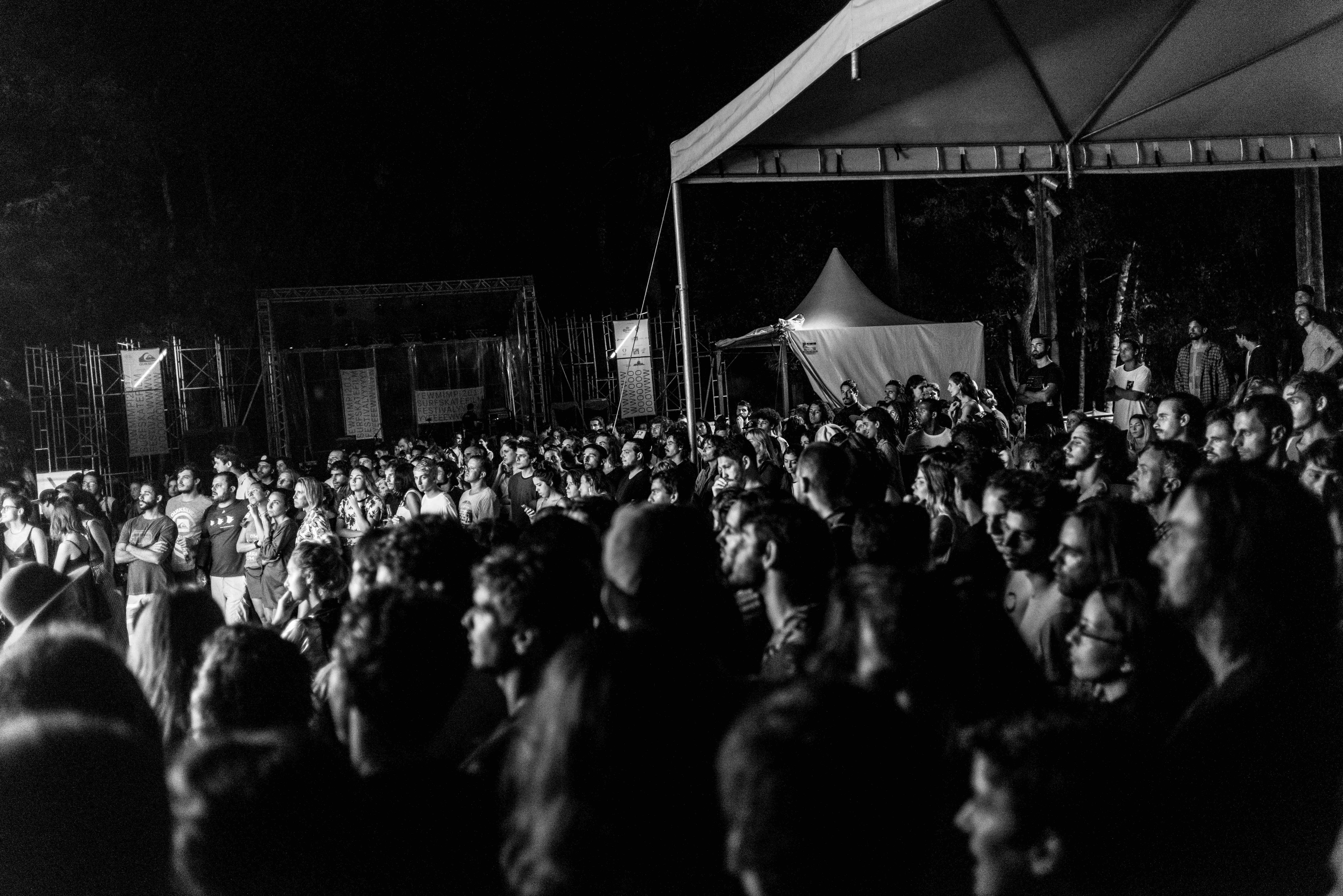 Ph.: Bruno Machado
Ph.: Bruno MachadoThe actual turning point came in 2014, when we decided to make the first edition of Mimpi outside of Porto Alegre, in Rio de Janeiro. It was a risky move, but the festival ended up being super well received by the local scene. It also became more accessible to people coming from different parts of Brazil and foreign countries, so since then, Rio has been the official location of Mimpi.
Regarding the concepts we choose for each edition, it is a way to have a guideline, or an inspiration theme, for most of the things we have to deal with and create when planning the festival. From visual identity to exhibitions, workshops, guests, musical line-ups… it’s not something we have to stick with, but we try to translate it as much as possible through different outputs.
These concepts usually have to do with some aspects of the audiovisual production, sometimes in a more abstract way, or just an element that is part of it, like last year’s “noise” ("ruído").
 Felipe Oliveira, hippy jump. Ph.: Pedro Damasio
Felipe Oliveira, hippy jump. Ph.: Pedro DamasioLSM: Yes, the 2017 edition had « noise » as its concept; can you please describe how that came about? Practically and logistically, how did you end up pulling it off and putting it together? What other concepts have you pushed before, and do you already have one in mind for this year’s edition?
Pedro: Like I said, we usually search for a theme of our interest that can work as an inspiration for the whole festival concept. It also has to make sense for both skate and surf scenes, which is kind of tricky.
Last year’s theme came after we realize how “noise” has become one of the main subjects that we portrait and discuss during the festival; whether it be represented by the sounds produced by the practices of skateboarding and surfing, the soundtracks of the films or even the music of bands and artists that perform during the event.
 Ph.: Juliana Rocha
Ph.: Juliana Rocha Hernando "Naño" Ramirez. Ph.: Fred Mortagne
Hernando "Naño" Ramirez. Ph.: Fred MortagneBesides the film exhibitions and the music performances, we ended up pulling it together at the programming through activities like, for example, the “live collaborative soundtrack” workshop - conducted by the duo of musicians and skaters Morcego de Là. You can see some footage of it in the documentary: that crazy, noisy catharsis [laughs]…
"“corre”: the Portuguese word for “run”, but also street slang for the process of doing whatever you have to do to produce something your own way"
The year prior, the concept was “trans / borda” which could literally be translated as “overflows”. At that time, we wanted to explore and expand different subjects related to surfing and skating, as if they were overflowing from the exhibitions' screens and flooding the whole area of the festival (does that even make sense?).
For 2018, we’re still struggling with the theme, but it should be some variation of “corre”: the Portuguese word for “run”, but also street slang for the process of doing whatever you have to do to produce something your own way. We were supposed to have the exact theme defined by now, but… you know.
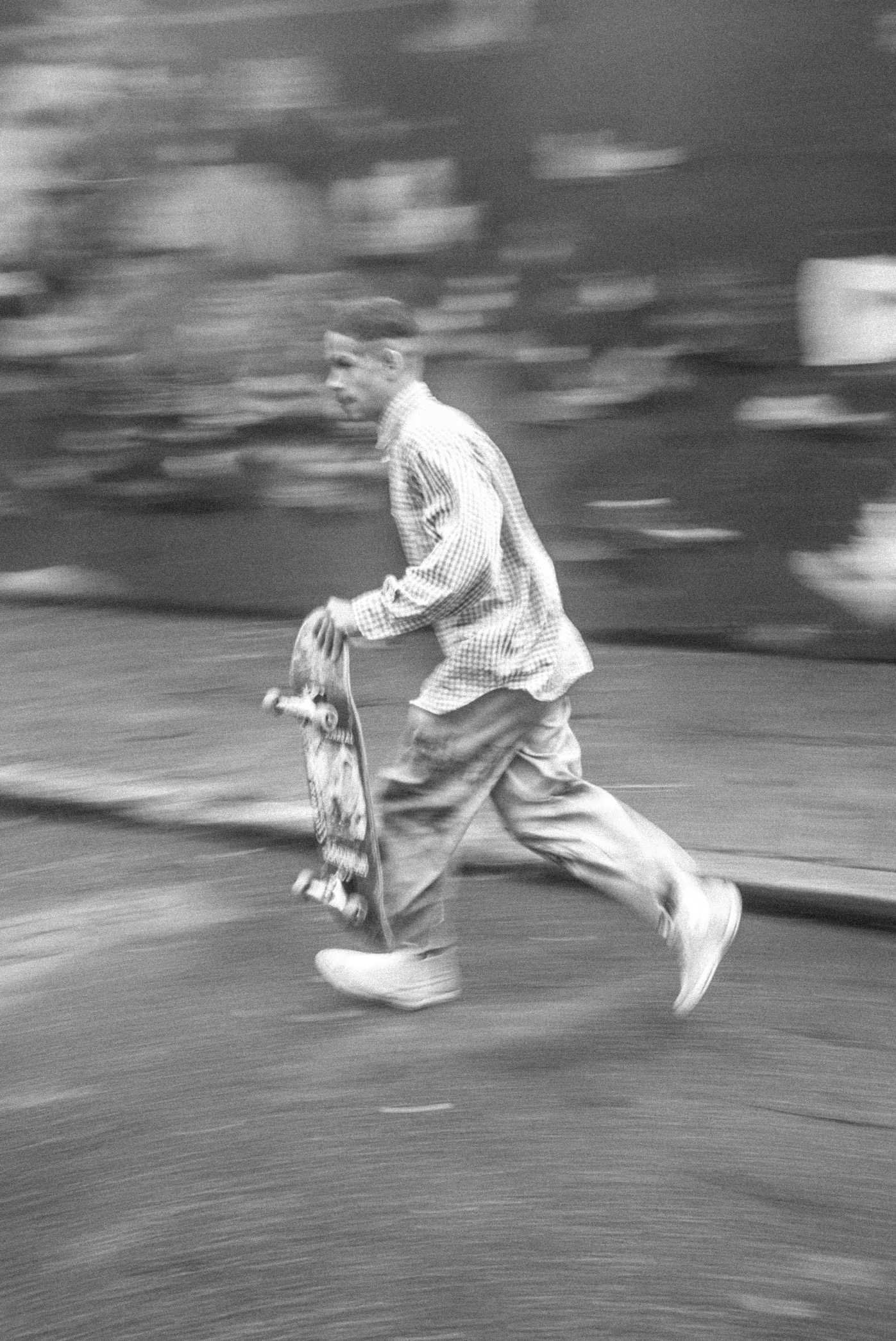
 Ph.: Fred Mortagne
Ph.: Fred MortagneLSM: How many people would you estimate are working on the festival, and how many were involved in the making of the recap video?
Rio De Janeiro is a large and densely populated city; how many people would you estimate the audience of last year’s, 2017 edition roughly made for? What aspect(s) of the event would you say draws most of the crowd there?
Surely as it doubles up as a surf festival (surfing being huge in Rio) and parties in original settings, skateboarding isn’t most people’s main focus there, or is it? Although, Mimpi still seems to attract an incredible amount of sincerely passionate skateboarders who are really eager to exchange with the next guy about their respective scenes, and are involved in constructive, creative, mostly independent stuff, even given public talks about them. Is the diversity amongst the audience hard to juggle with? Or is it part of the human experience and do you embrace it as such?
Pedro: To me, the barriers we have to break down in order to put surfing and skateboarding under the same roof is one of the best things about Mimpi.
You know how the skate community is reluctant to mix subjects that are not necessarily related to skateboarding. And especially as far as surfing is concerned, most skateboarders really have no interest in it whatsoever, and a lot of preconceptions about it. So, it was like an ant work to make the festival grow amongst the scene; we really had to take one little step further every year. But thanks to that, we have created some solid connections along the way and that’s why you met so many passionate people there.
"These unlikely connections make all the effort we put into the festival worth it"
The thing is… We never wanted to make a super core festival where just skaters, surfers and audiovisual people would attend. The idea is to celebrate those cultures in a multiple way, so the audience ends up reflecting this diversity, which is great! It’s cool to see a bunch of surfers and non-skaters getting stoked at a skate film exhibition, or to witness some epic hangouts going on at the hostel where everybody is staying: skaters, surfers, musicians, artists and people from all over. These unlikely connections make all the effort we put into the festival worth it.
So yeah, we totally embrace the human experience!
 Vantte Lindevall getting his prize. Ph.: Juliana Rocha
Vantte Lindevall getting his prize. Ph.: Juliana RochaAnd especially in 2017, we managed to make the festival more accessible to everyone, thanks to that wonderful park we had as a location. Parque Lage is one of the most historical and beloved places in Rio and there are all means of transportation to get there, so people really showed up.
It was our biggest audience ever, we estimate around three thousand visitors during the four days and nights.
 Ph.: Juliana Rocha
Ph.: Juliana Rocha Ph.: Rafael Di Celio
Ph.: Rafael Di CelioAbout the team working at the festival, there’s a small group of seven people that is in charge of planning and taking care of the main decisions. But when the production really kicks of, the crew starts to grow up to the point where more than thirty people get involved, from guys who build the scenography to the curators, producers, designers, people that run the communication…
"The audiovisual side of skateboarding and surfing will always be the starting point, for sure; but we like to explore how far we can get from it"
The recap video, on other hand, was basically made by three dudes: Guilherme Becker, Lucas Neves and myself, with the help of some fellow filmmakers that were in Rio for the festival.
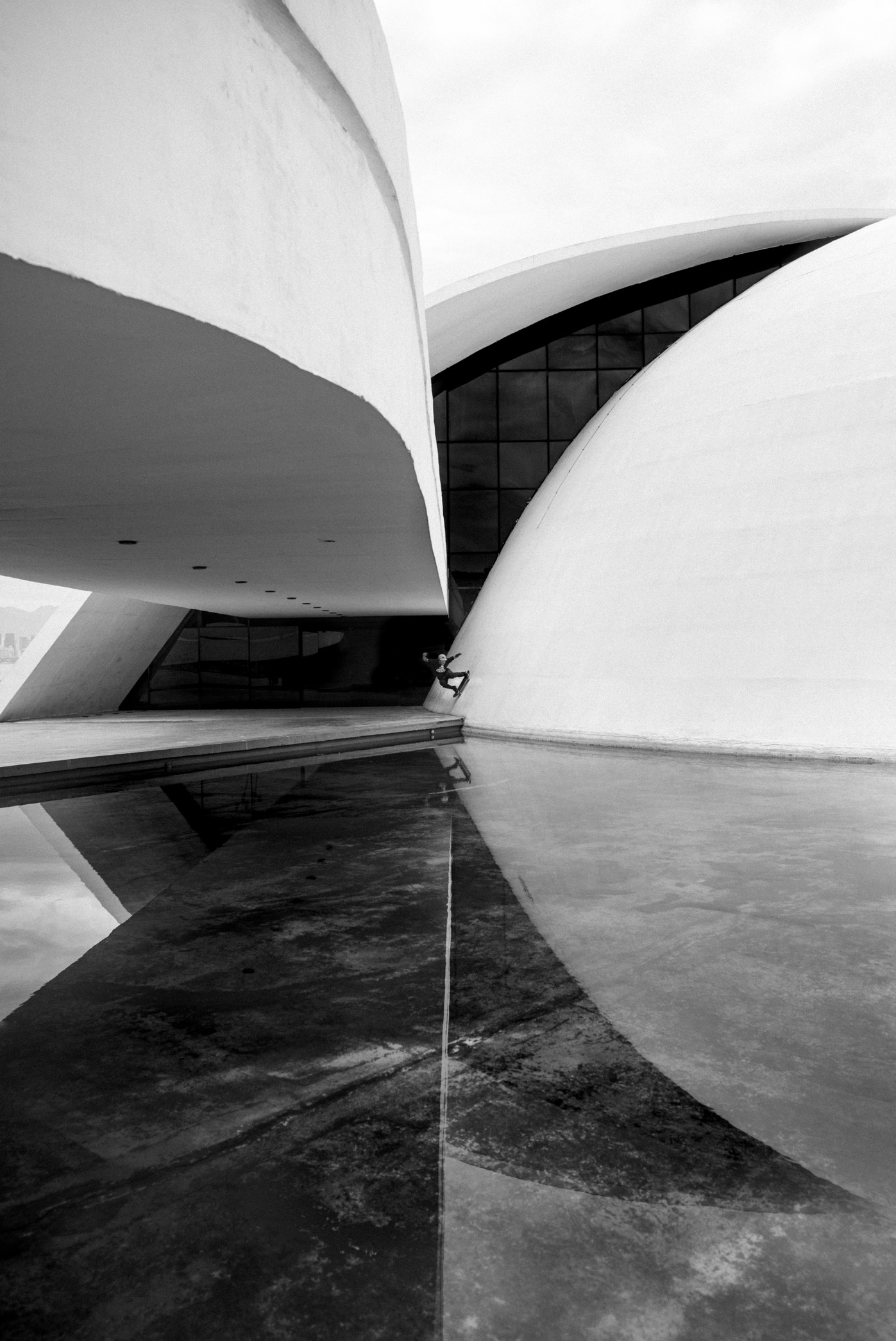 Fernando Denti, fakie wallride. Ph.: Fred Mortagne
Fernando Denti, fakie wallride. Ph.: Fred MortagneLSM: Said recap video of the 2017 edition doubles up as a full-on documentary with interviews and experimental editing, thereby demonstrating the sincerity of your approach with Mimpi. What areas are you trying to explore with your event; what messages are you trying to convey?
Pedro: I’d say we’re still figuring it out. And maybe we’ll be figuring it out forever.
I think this festival is about connections: of people, of scenes, of creative expressions… and we’re constantly looking for new connections to be made.
 Fred Mortagne's exhibition. Ph.: Juliana Rocha
Fred Mortagne's exhibition. Ph.: Juliana Rocha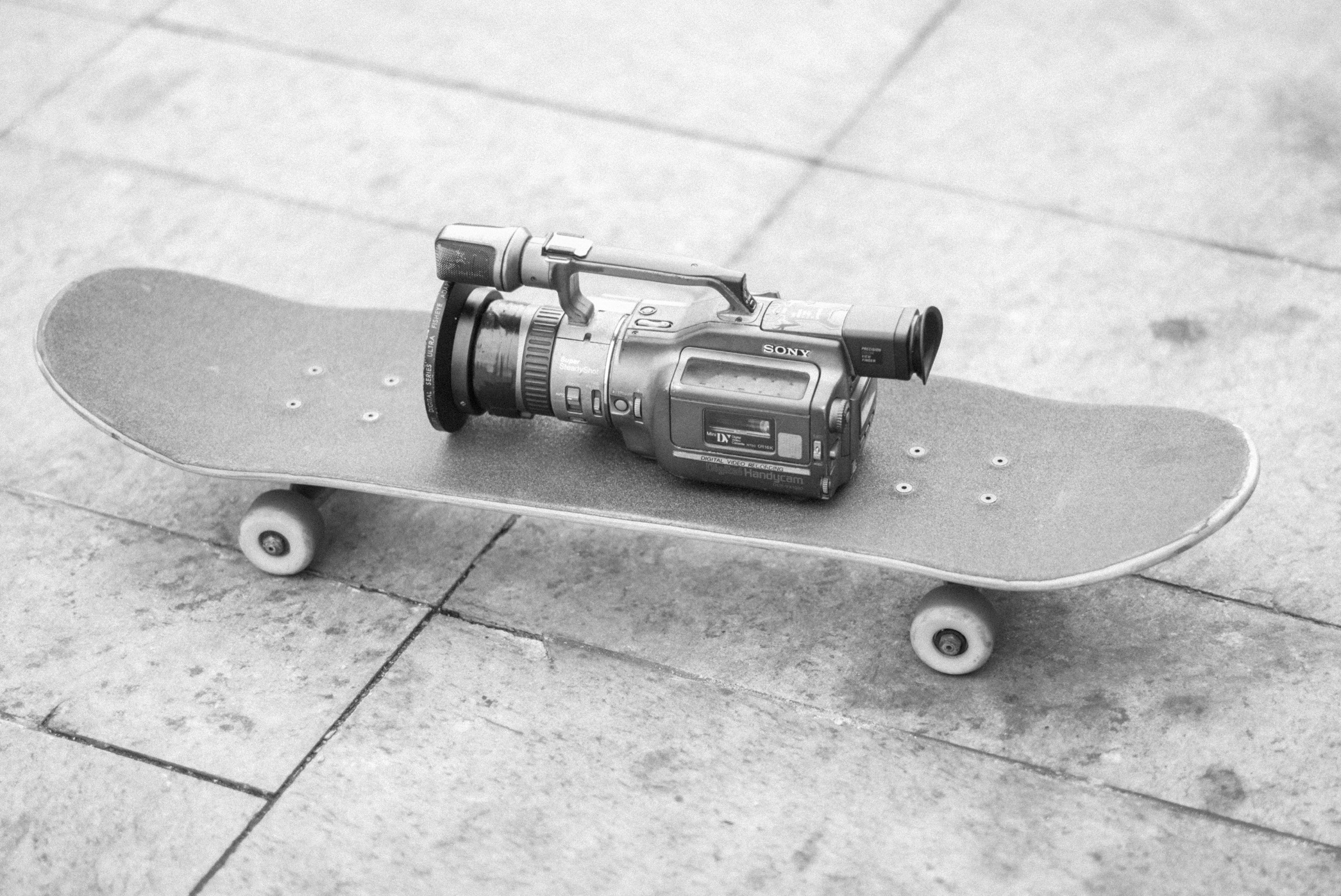 Ph.: Fred Mortagne
Ph.: Fred MortagneThe audiovisual side of skateboarding and surfing will always be the starting point of everything, for sure; but we like to explore how far we can get from it.
LSM: Now this is typically the first question one usually asks in interviews but here it just seemed more fitting later after discussing your personal and emotional involvement in the festival, what’s up with your history with skateboarding? Where do you come from, when and where did you start? Where did you grow up skating, and how did you progressively turn into the person you are now, in charge of the organization of such a big event?
Pedro: I started to skate when I was about eleven, when my family moved from Rio de Janeiro to a small countryside city in the south of Brazil, where we lived for three years.
This environment change brought a new perspective to my life, since I could experience the freedom to explore an entire city by myself for the first time, something I could never do at such age in a huge place like Rio.
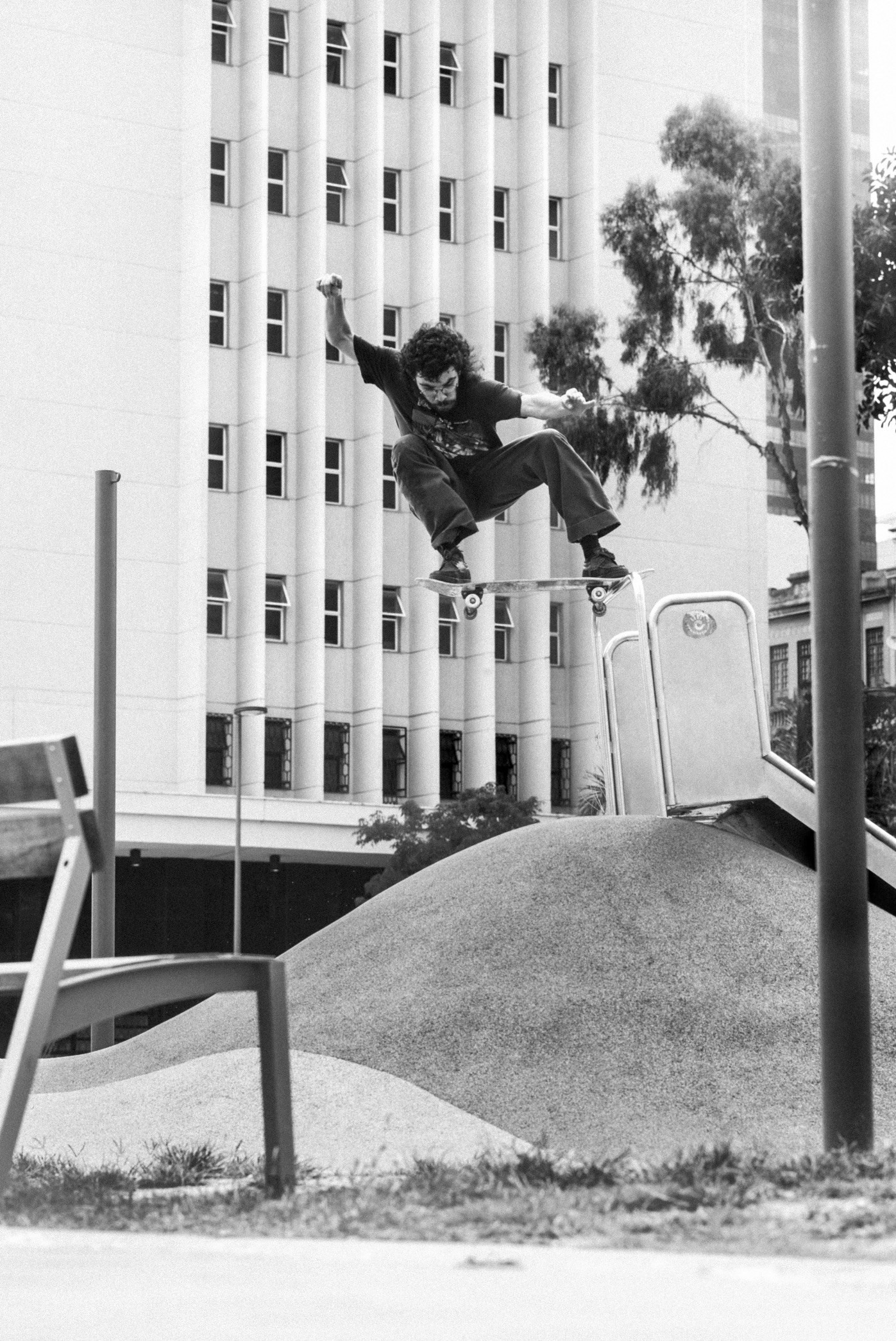 Alexandre Neaime aka. Cotinz, noseslide. Ph.: Fred Mortagne
Alexandre Neaime aka. Cotinz, noseslide. Ph.: Fred MortagneAt that time, I had also started my passion for music, so both subjects quickly became my main interests in life and the catalysts of all my friendships; something that hasn’t changed much since then.
I paused skating at some point of my twenties, but never lost contact with the culture. In fact, I always had a skateboard with me, even if it was just for locomotion purposes, but in the beginning of the 2000’s, it really came back fully into my life.
At the same time, I was involved in the producing of an early free magazine in Porto Alegre called Void, and it had skateboarding as one of its subjects. I also started to collaborate with another young free magazine from the south of Brasil called Vista Skateboard Art. That was the beginning of my involvement with skateboarding content, writing articles and photographing for the mags, producing events and making videos for our local brand Yerbah Decks.
The cool thing is that after almost fifteen years, both magazines are still alive and collaborating: Void is behind the production of Mimpi and Vista is one of the festival’s main media partners.
 Ph.: Bruno Machado
Ph.: Bruno Machado  Fred Mortagne. Ph.: Juliana Rocha
Fred Mortagne. Ph.: Juliana RochaIn the last few years, I haven’t been skating much due to my work and family routine, and especially because both my knees are fucked. But I constantly dream about skateboarding. Those annoying dreams where I can land tricks that I never had in my bag…
LSM: I could see the screening of « Vladimir » especially moved you at the 2017 event; you had even set it up in the most beautiful room available at Parque Lage, turning it into some kind of sanctum.
Due to operating in a much smaller place with less general effervescence, those guys operate at a much smaller scale as you do with Mimpi all the while retaining a similar passion to yours, and I remember you told me the film reminded you of you guys when you were first starting out. Is there anything you’d like to expand on? Do you see a future in this type of happenings and do you have any ideas of how they could link up?
Pedro: I’ve been following the Vladimir festival for some time, and even though I’ve never had the chance to be there, I always felt the commitment of those guys and the effort they put into the festival every year. I have so much respect for that, so I really wanted to make the premiere of “Vladimir” a special moment in the Mimpi program.
After watching the film and talking with you, it was great to realize the similarities in the stories of two festivals that deal with such different realities. I didn’t expect that. It shows that there is no single way to make things happen, it’s just a question of motivation and taking the right usage of the resources you have at your disposal.

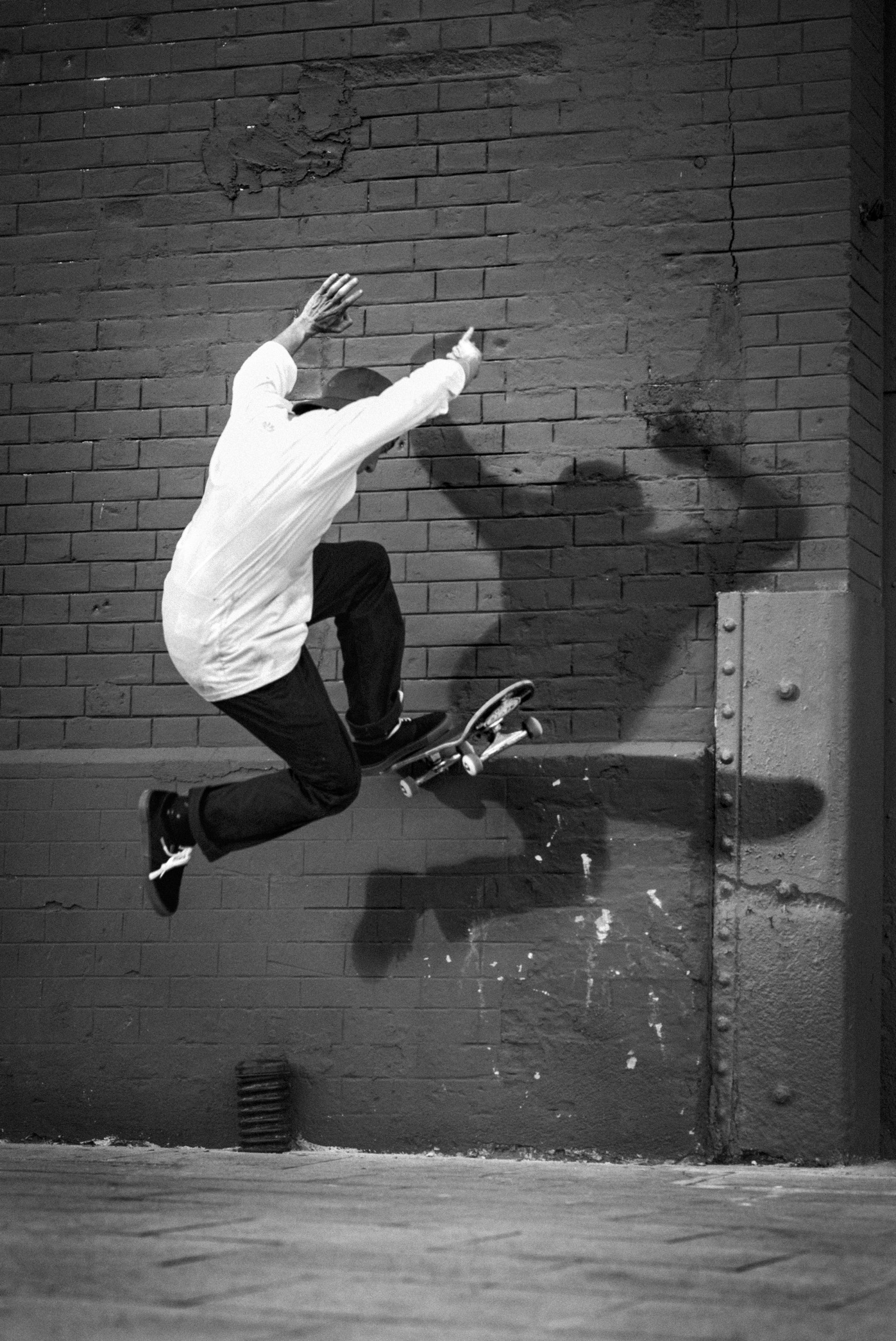 Aymeric Nocus, no-comply five-o. Ph.: Fred Mortagne
Aymeric Nocus, no-comply five-o. Ph.: Fred MortagneAnd if you have the opportunity to mix your resources with someone else’s, in a complementary way like we did, that’s perfect!
We loved to make this first joint between Vladimir and Mimpi last year; and we’re planning to keep it going in 2018, this time in Fazana.
LSM: Anything special on your mind for this year’s Mimpi? Any last words?
Pedro: No… Please! I’m used to the interviewer's side… It’s a struggle on this one!
But thanks for this amazing support and for the kind words. Hope to see your spoon-bending skills back here this year. And please bring Benja. Braza misses Benja!
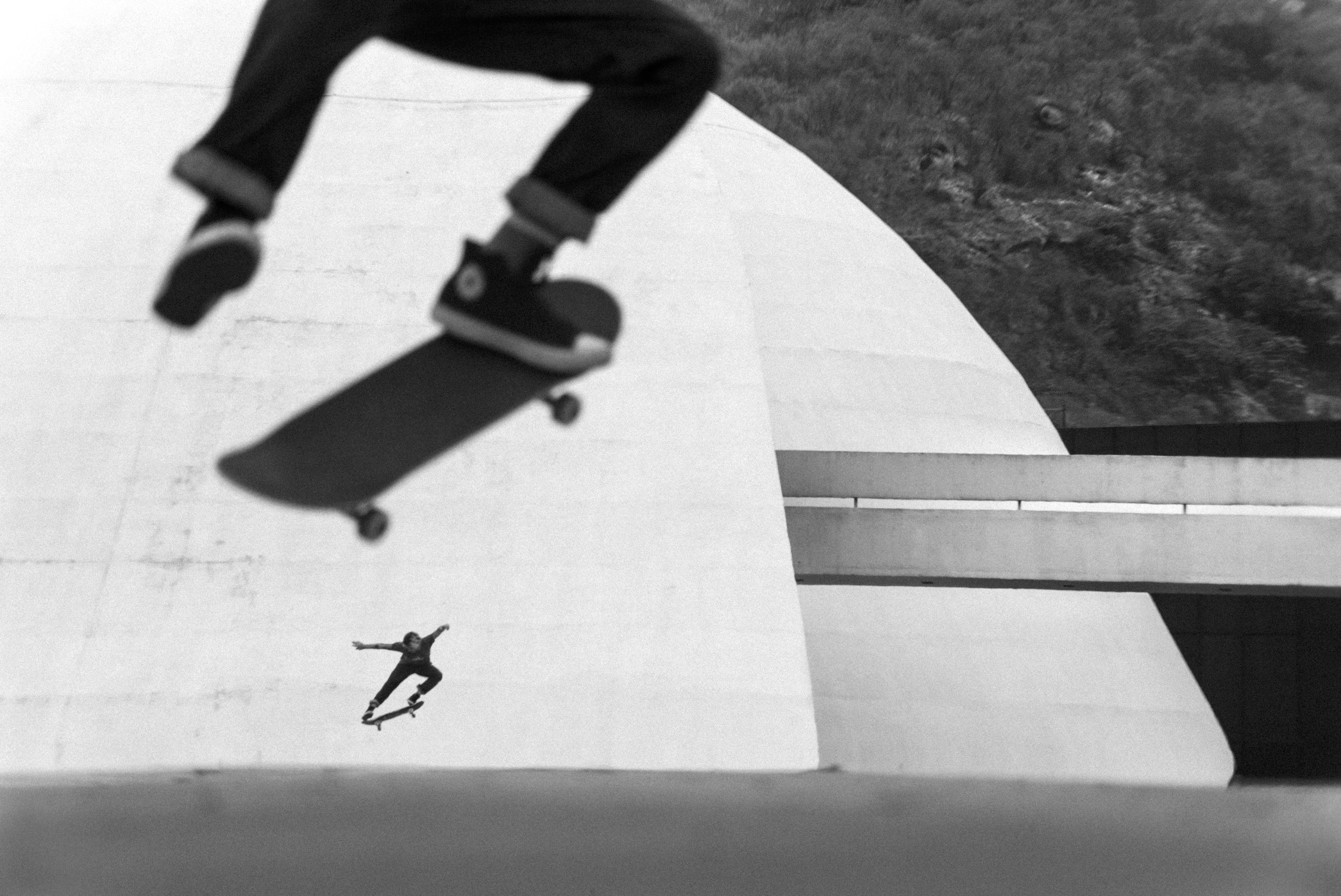 Hernando "Naño" Ramirez, ollie and kickflip. Ph.: Fred Mortagne
Hernando "Naño" Ramirez, ollie and kickflip. Ph.: Fred Mortagne